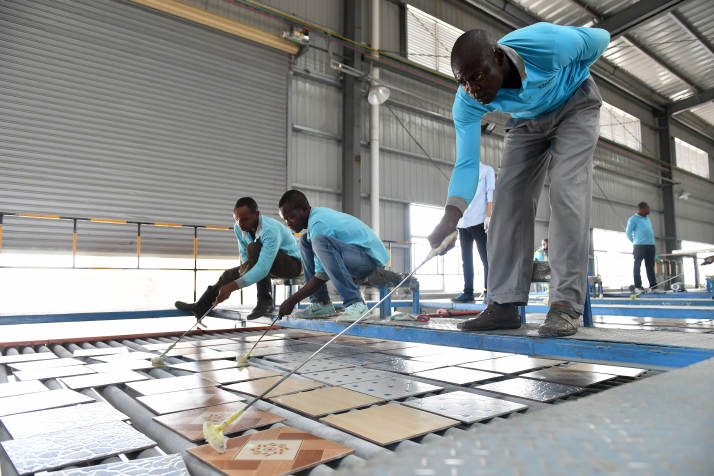China’s Dual Circulation Policy Will Enhance Sino-African Economic Cooperation

In the next period, China-Africa economic and trade cooperation should move from a stage where scale is the primary goal to one that focuses on efficiency, health, safety and sustainability.
The Fifth Plenary Session of the 19th Central Committee of the Communist Party of China, held on October 26-29, put forward a comprehensive guideline for the 14th Five-Year Plan (2021-25), which covers major aspects of China’s socio-economic life.
The plenary session also laid a strong emphasis on the “dual circulation” strategy to counter the backlash against economic globalization. The dual circulation development pattern, in which domestic and foreign markets complement and reinforce one another, with the domestic market as the mainstay, has been viewed by many analysts as a viable solution for China to build up resilience against external shocks and share its growth opportunities with the rest of the world.
Despite the fact that the hallmark of a strong economy is a smooth internal economic cycle, China still deeply appreciates the importance and benefits of its deep engagement with international economy. As Africa’s largest trading partner, a stronger domestic economic circulation within China will create a market for African exports and enhance Sino-African economic cooperation.
Global economic woes
Since 2018, along with the changes in the global political and economic environment and the rise in unilateralism and protectionism, the traditional global circulation has notably weakened. The trend of a “slow globalization” is taking its place.
Besides, as the COVID-19 pandemic sends shudders across the world, the world economy is likely to remain in the doldrums. The recovery of international trade and investment risks being further encumbered by the headwinds against globalization.
As a result, the international economic growth model based on globalization is faced with huge challenges.
In this situation, many countries have resorted to conservative policies to stimulate domestic economic circulation, which will significantly cool down international investment activity.
At the trade level, major developed countries and emerging economies will try to balance imports and exports and achieve sustainable trade growth. This will also bring about a reduction in the interaction between major economies and a reduction in interdependence. The role of intra-regional trade and domestic trade in global economic growth will be significantly strengthened.
The economic impact of the pandemic on developed Western countries, where the services industry is dominant, is more pronounced. In the post-pandemic era, the share of developed countries in global demand will shrink, and emerging economies such as China will play a more important role on the demand side.
Rebalancing in progress
Against this backdrop, China introduced the “dual circulation” development pattern. In the slow globalization, post-pandemic era, China’s opening-up strategy and economic growth model need adjustments.
For China, the goal of opening to the outside world will change from using external resources to achieve high growth to attracting international high-end elements and turning them into Chinese technologies and brands, raising the country’s competitiveness and enhancing its position in the global value chain.
The “dual circulation” strategy will promote the transformation of China’s economic growth model from export-driven to domestic demand-driven. The growth model will also gradually change from investment-driven to consumption-driven. An important task for the Chinese Government from now on is to create a new momentum for economic growth through consumption expansion and upgrading.

High-quality development
In the slow globalization, post-pandemic era, the willingness of the world’s major economies for multilateral cooperation will decrease. In the future, the EU countries and key participating countries of the Belt and Road Initiative will rise in importance in China’s international economic cooperation. African countries will remain China’s important international economic cooperation partners.
From the perspective of the scale and volume of cooperation, China-Africa economic and trade cooperation has faced some obstacles in recent years. So, in the next period, China-Africa economic and trade cooperation should move from a stage where scale is the primary goal to one that focuses on efficiency, health, safety and sustainability.
In the future, high-quality development should be the primary goal for China-Africa cooperation. Therefore, the next stage of China-Africa economic and trade cooperation should fully consider the new characteristics of slow globalization and the post-pandemic era, along with their implications. China and African countries should make more scientific and targeted fine-tuning based on the successful practical experience of cooperation in the past decades.
The scale of trade will remain an important goal of China-Africa cooperation, but should not be the primary goal. China and Africa should pursue trade balance and form a healthy and sustainable trade pattern in the long-term interests of both sides. China should help Africa diversify its exports to China by expanding tariff reductions and exemptions, and in particular adopting various measures to help Africa export non-resource products to China. On the other hand, African countries need to work to improve their own production capacity and level to ensure that more high-quality goods can be exported. The substantive advancement of the African Continental Free Trade Area will become an important tool for advancing China-Africa trade cooperation.
In terms of China-Africa investment, the scale of investment will become a secondary criterion for measuring the progress of bilateral investment cooperation. The primary goal will be to pursue high-quality and sustainable economic and social development of China and Africa through investment cooperation. Investment should focus more on areas where both parties have strong complementarities, such as the manufacturing industry, and more emphasis should be placed on areas directly related to people’s livelihood, such as the information industry, medical and health industries, and emerging areas such as marine economy.
In the fields of science and technology, humanities, education, medical and health care, China-Africa cooperation should receive greater attention, and the digital economy and financial technology may become a new highlight of cooperation. China’s mature digital technology can play a big role in inclusive finance as well as inclusive development in Africa.
At present, China should use various methods to help African countries respond to the pandemic, restore economic and social order as soon as possible, and create a good macro-environment for China-Africa economic and trade cooperation. In the long run, China and Africa should cooperate to promote the docking of China’s Belt and Road Initiative with the African Union’s Agenda 2063, support the integration of African industrialization and China’s international production capacity, and ensure the realization of the high-quality development goals of China-Africa economic and trade cooperation.
Zhang Chunyu is research fellow at the China Africa Institute, Chinese Academy of Social Sciences; Zhu Simin is research assistant at University of Chinese Academy of Social Sciences.
 Facebook
Facebook
 Twitter
Twitter
 Linkedin
Linkedin
 Google +
Google +










